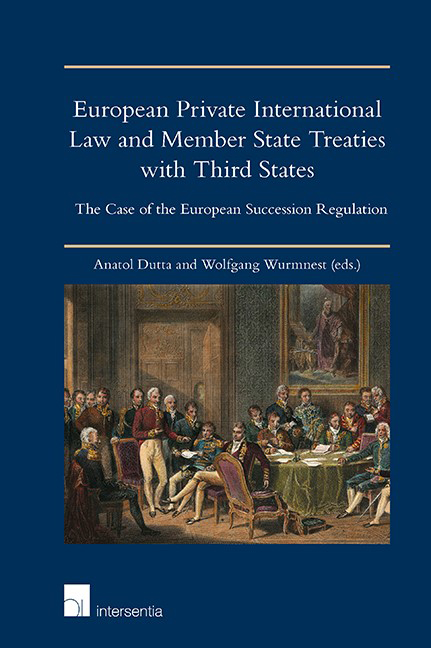 European Private International Law and Member State Treaties with Third States
European Private International Law and Member State Treaties with Third States Book contents
- Frontmatter
- Foreword
- Contents
- List of Treaties and Conventions
- List of Abbreviations
- List of Contributors
- Introduction
- Questionnaire
- PART I THE PERSPECTIVE OF EU MEMBER STATES
- PART II THE PERSPECTIVE OF THIRD STATES
- PART III THE PERSPECTIVE OF THE EUROPEAN UNION AND A COMPARATIVE OUTLOOK
- Annex
- Index
- About the Editors
Foreword
Published online by Cambridge University Press: 12 November 2019
- Frontmatter
- Foreword
- Contents
- List of Treaties and Conventions
- List of Abbreviations
- List of Contributors
- Introduction
- Questionnaire
- PART I THE PERSPECTIVE OF EU MEMBER STATES
- PART II THE PERSPECTIVE OF THIRD STATES
- PART III THE PERSPECTIVE OF THE EUROPEAN UNION AND A COMPARATIVE OUTLOOK
- Annex
- Index
- About the Editors
Summary
Like many other EU regulations, Article 75 of the Succession Regulation contains rules which clarify the relationship between the Regulation and existing multilateral and bilateral conventions.
The Regulation prevails on existing multilateral and bilateral conventions between the Member States. This solution is understandable because it is the only way to create a uniform international succession law between the Member States. The only exception is the Hague Convention of 5 October 1961 on the Conflicts of Laws Relating to the Form of Testamentary Dispositions. The provisions of this Convention apply, instead of Article 27 of the Succession Regulation, with regard to the formal validity of wills and joint wills. The implications of the prevalence of the Regulation are not too significant because, besides some bilateral treaties, the Convention of 1961 is the only important convention on international succession law. The Hague Convention of 2 October 1973 concerning the International Administration of the Estates of Deceased Persons was only ratified by the Czech Republic, Portugal and Slovakia. Other conventions such as the Convention of 16 May 1972 on the Establishment of a Scheme of Registration of Wills and the UNIDROIT Convention of 26 October 1973 providing a uniform law in the form of an international will, deal with substantive succession law which is not covered by the Regulation.
As to treaties between Member States and third States, a distinction is to be made between treaties concerning recognition and enforcement of foreign decisions and treaties concerning jurisdiction and applicable law. Although the first category covers decisions in succession matters, they do not confict with the Succession Regulation, which is limited to the recognition and enforcement of decisions of the Member States. The second category conflicts with the Succession Regulation, but the Regulation does not affect the application of such treaties. They prevail on the Regulation. This solution is nothing more than the application of an important rule of international law, namely pacta sunt servanda as enshrined in Article 351 Treaty on the Functioning of the European Union. Until now, it has not been easy to get an overview of all the treaties concluded by the Member States with third States. It has been even more difficult to gain an insight into the application of those treaties in the contracting States.
- Type
- Chapter
- Information
- European Private International Law and Member State Treaties with Third StatesThe Case of the European Succession Regulation, pp. v - viiiPublisher: IntersentiaPrint publication year: 2019


